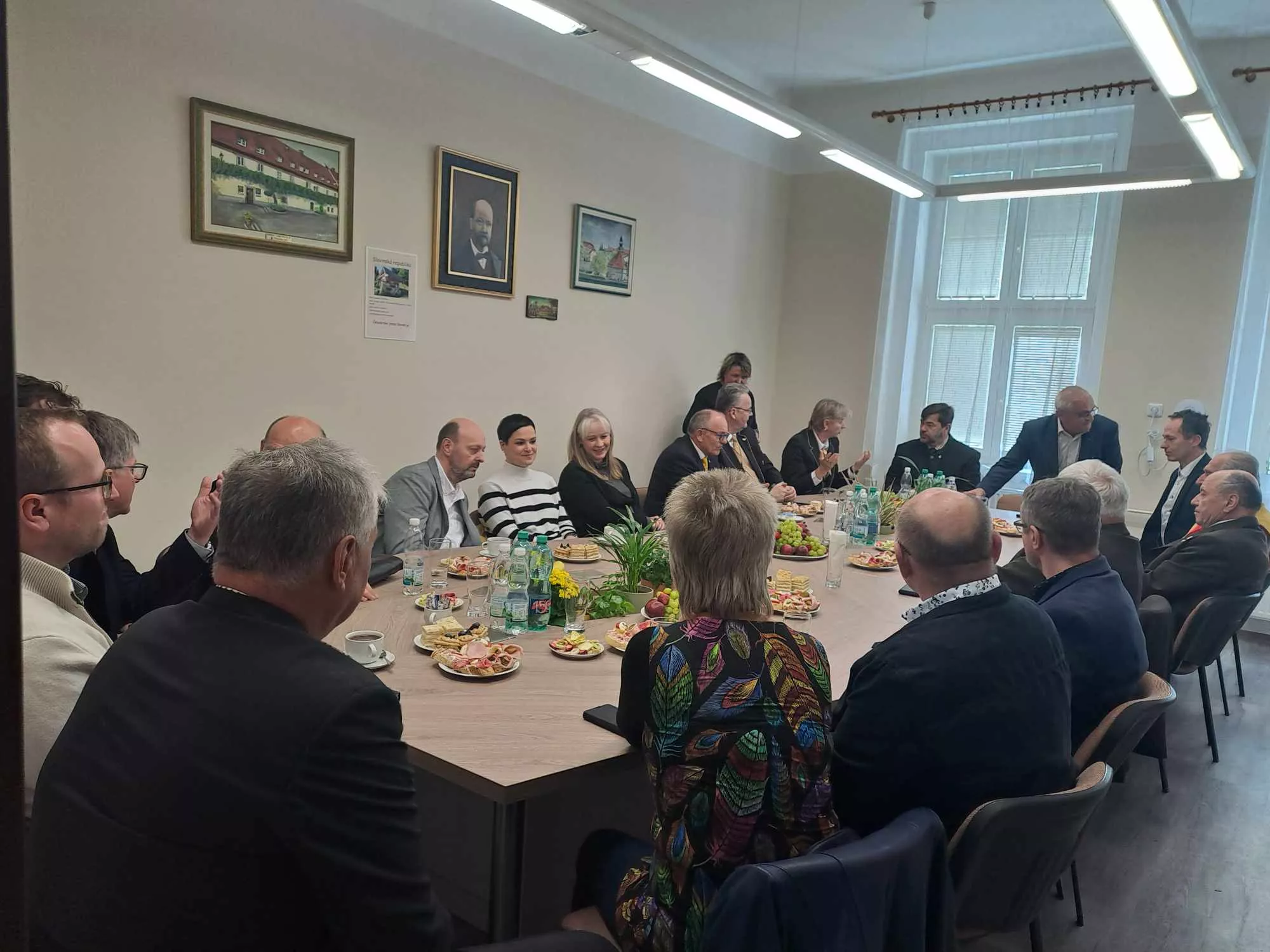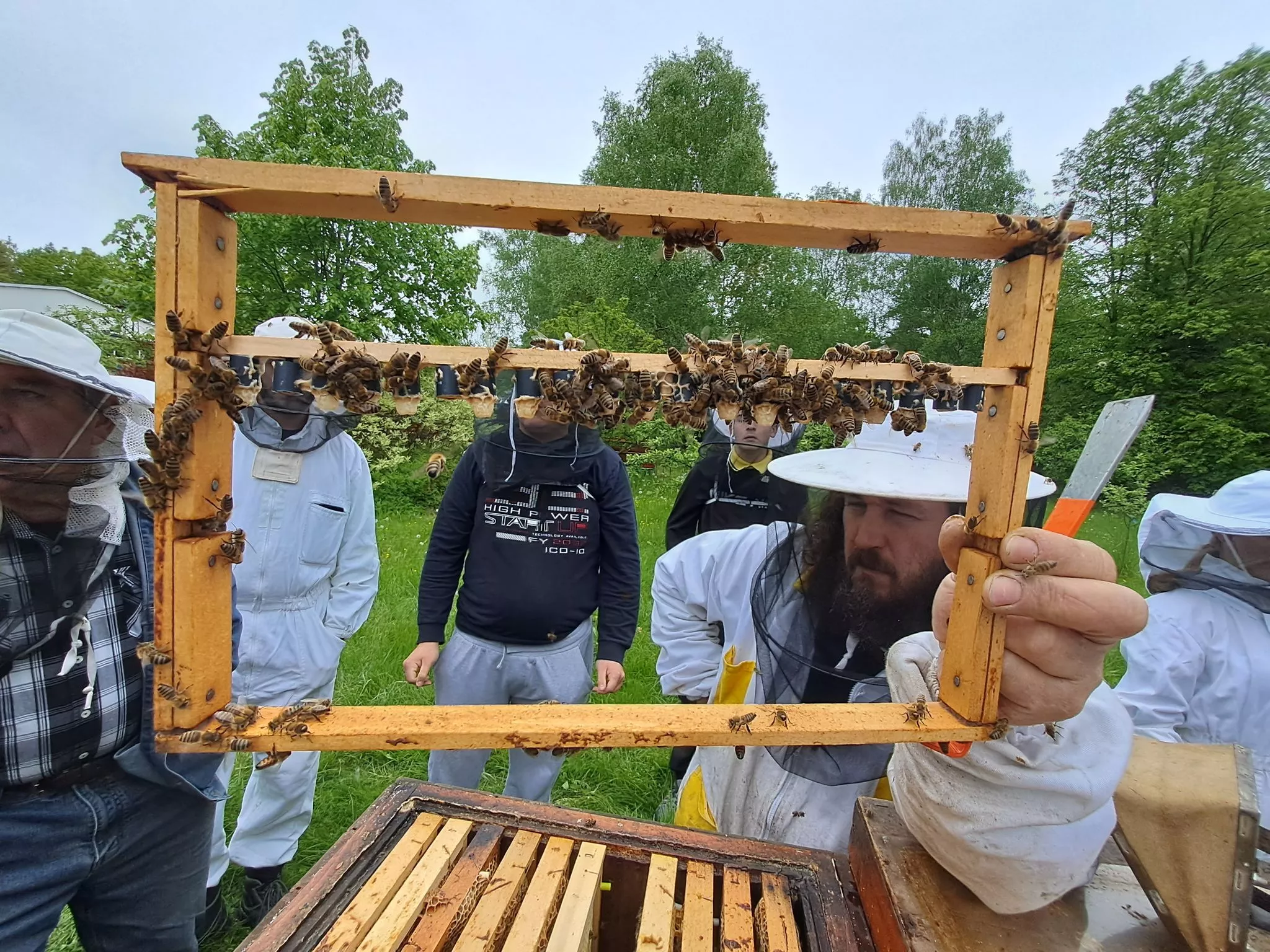BEES GIVES US FOOD AND HEALTH
ERASMUS+ PROJECT: "BEES GIVE US FOOD AND HEALTH"
In September 2022, we commenced the collaborative Erasmus+ project KA210-VET – Bees give us food and health with the Secondary Vocational School for Beekeeping, Střední odbodné učiliště včelařské – Včelařské účilátní centrum, o.p.s.
Visit our website: beehealth.si
Read more: https://www.bts.si/vrsta/mednarodni-projekti/cebele-nam-dajejo-hrano-in-zdravje-mednarodni-projekti/

During the project, we conducted four exchanges – two in Slovenia and two in the Czech Republic. Throughout these exchanges, our bonds were strengthened, knowledge was exchanged, and insights into the intricacies of beekeeping and localities were gained.
The Czech Beekeeping School from Nasavrky operates under the auspices of the Ministry of Agriculture and the Beekeeping Association of the Czech Republic. It mainly educates adult beekeepers with various previous educations. It is a kind of centralized form of beekeeping education in the Czech Republic. The training takes place on weekends, during which the training participants acquire all the necessary skills for independent beekeeping. The school is equipped with the most modern beekeeping equipment for pouring honey, extracting, and processing wax. They have their own arboretum, dormitory, beekeeping shop, and kitchen. They have a number of apiaries in remote locations, one dedicated to breeding queens. They also have Filip Terč's room, which is our common bond. Filip Terč is the founder of modern apitherapy, a doctor who was born in the Czech Republic. He worked in Maribor and treated patients with rheumatic diseases with bee venom. He recorded his observations and successes in treatment and also published them. He was also a beekeeper, teacher, and president of the beekeeping association.

Learn more about Filip Terč: https://beehealth.si/filip-terc/
Both times we were warmly welcomed at school. We were able to try our hand at breeding queens, making honeycombs, and also candles. We learned about their beekeeping system. We visited their beekeeping museum and an automatic honey dispenser. In the api-house, we inspected the families who were diligently carrying among the oilseed rape fields, whose fields stretched as far as our eye could see as we drove to the various locations. With the help of a confectioner, we created honey cakes. In the afternoon, we also visited the Celtic village with typical houses, barns, and "indigenous inhabitants". We also visited the wildlife sanctuary, two interesting handicraft companies (making taps and ornaments), the Lanškroun secondary school (which also teaches veterinary techniques), their cattle and horse stables, and a large dairy farm. We were able to make our own cheese and try our hand at a rectal examination of Erna the cow.
In Slovenia, our friends learned about the beauty of our place and the characteristics of our beekeeping. Among others, they visited the Beekeeping Center of Slovenia, the Beekeeping Museum in Radovljica, the House of Kranjska Bees, the apitherapy apiary Melisa, the apitherapy apiary of the Domžale Beekeeping Society, the Šemen Štefan apitherapy apiary, the social apiary of the Lovrenc na Pohorje Beekeeping Society, the Agricultural Institute of Slovenia, the Gorenjska Beekeeping Center, the House medu Božnar, and my beehive with medium and large Kirars in Lovrenec in Pohorje. In addition to the presentation, workshops, and practical demonstrations were held at all locations. They learned beekeeping in our hive systems.
As part of the project, we also prepared bees for winter, treated varroa, and compared methods of treatment in both countries. We planted honey plants in both countries; some of them we also exchanged. We learned about different bee products, how they were properly packaged and labeled, and their importance in our diet and in the treatment and prevention of various diseases.
Read more: https://www.bts.si/projekt/embaliranje-in-oznacevanje-medu/
Read more: https://www.bts.si/projekt/zatiranje-varoje/
Read more: https://www.bts.si/projekt/tradicionalni-slovenski-zajtrk/
Read more: https://www.bts.si/projekt/sajenje-medovitih-rastlin/
Both schools also acquired a lyophilizer with the funds of the project, which allows us to extend the shelf life of bee products (royal milk, apiarnilla, pollen), and at the same time prepare fruits, vegetables, and herbs for creamed honey mixtures.
Read more: https://beehealth.si/liofilizacia/
Together, we established an online classroom for beekeepers, apitherapists, and anyone interested in learning more about it. The online platform will offer content in English, Slovenian, and Czech. Throughout the project, we fostered connections with our Czech counterparts, bolstered international relations, shared knowledge and experiences, and endeavored to cultivate a more positive attitude towards nature and its values through awareness-raising efforts. With the online classroom accessible at the link https://beehealth.si, we anticipate forging new acquaintances, solidifying existing contacts, and elevating beekeeping and apitherapy to a higher European standard, thereby extending the reach of our values and expertise.
Read more: https://beehealth.si/
Written by: Kristina Dolinar Paulič
Dolinar Paulič Kristina, DVM, is a teacher at the Biotechnical School Maribor, where she teaches professional subjects. She is also an organic beekeeper, apitherapist, and hunter. She is a member of the Education Commission at the Beekeeping Association of Slovenia.
Comments
Hi
Dear Kristina, we are reaching adults with the beekeeping course we opened in Kayseri. The individual who completes the Beekeeping Course Program,
To take the necessary occupational health and safety measures for beekeeping,
To make the necessary preparations for beekeeping and to care for bees, to harvest bee products and to protect them from pests.
is intended.
I would like to cooperate with you on May 20, World Bee Day. Thank you for the information you provided.
World Bee Day
Dear Hakan!
In what way would you like to cooperate?
A central event for world bee day will be on 18.5.2024 in Beltinci. There will come members of all beekeeping associations and also the president of the contry.
On 20.5.2024 local events will take place in several different places in Slovenija.
https://www.czs.si/Upload/Povabilo%20(1).jpg
https://visitzirovnica.si/events/20-maj-jansev-dan/
Good work with your bees and beekeeping course!





Happy 20 May World Bee Day
The purpose of World Bee Day is to put bees on the agenda, whose importance is becoming more and more understood all over the world and in our country day by day, and which has many benefits for humanity along with its existence for millions of years; It is to remind us of the importance of bees and other pollinators (plant pollinators) for humanity and our world and to raise awareness on this issue.
Albert Einstein said, “If bees disappear from the face of the earth, humans will only have 4 years to live. "If there are no bees, there will be no fertilization, no plants, no animals, no humans." His assessment strikingly states that bees are extremely important for human beings.